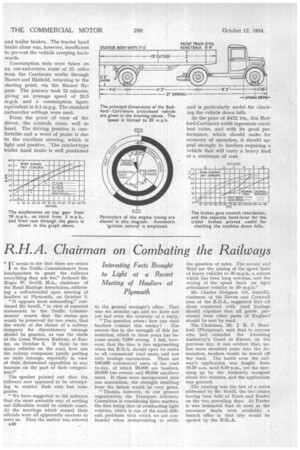R.H.A. Chairman on Combating the Railways
Page 58

If you've noticed an error in this article please click here to report it so we can fix it.
Interesting Facts Brought to Light at a Recent Meeting of Hauliers at Plymouth
" IT seems to me that there are orders 1 to the Traffic Commissioners from headquarters to grant the railways everything they ask for," declared Mr. Roger W. Sewill, M.A., chairman of the Road Haulage Association, addressing a well-attended open meeting of hauliers at Plymouth, on October 3.
"It appears most astounding," continued Mr. Sewill, "in view of repeated statements in the Traffic Commissioners' courts that the status quo would be preserved for two years, that the whole of the claims of a railway company for discretionary tonnage should be granted, as was the claim of the Great Western Railway, at Exeter, on October 2. If there be too many vehicles on the road, how can the railway companies justify putting on more tonnage, especially in view of their determined .opposition to any increase on the part of their competitors?"
The speaker pointed out that the railways now appeared to be attempting to restrict their own bus companies.
"We have suggested to the railways that the most amicable way of settling our difficulties would be outside court. At the meetings which ensued their officials were all apparently anxious to meet us. Then the matter was referred to the general manager's office. That was six months ago and we have not yet had even the courtesy of a reply. "The question arises how can road hauliers combat this enemy? The answer lies in the strength of this Association, which in three years has become nearly 7,000 strong. I feel, however, that the time is fast approaching when the RI-LA. should open its ranks to all commercial road users, and not only haulage contractors. There are 100,000 commercial users of the road to-day, of which 20,000 are hauliers, 20,000 bus owners and 60,000 ancillary users. If these were incorporated into one association, the strength resulting from the fusion would be very great " Thanks, however, to our present organization, the Transport Advisory Committee is considering three matters, the first being that of overloading light vehicles, which is one of the most difficult problems with which we are confronted when endeavouring to settle the question of rates. The second and third are the raising of the speed limit of heavy vehicles to 30 m.p.h., a reform 'which has been long overdue, and the raising of the speed limit on light articulated vehicles to 30 m.p.h."
Mr. Charles Hodgson (St. Austell), chairman of the Devon and Cornwall area of the R.H.A., suggested that all those connected with road haulage should stipulate that all goods purchased from other parts of Englan.1 should be sent by road.
The Chairman, Mr. J. R. F. Bradford (Plympton), said that to anyone who had attended the Licensing Authority's Court at Exeter, on the previous day, it was evident that, unless more members came into the Association, hauliers would be forced off the road. The battle over the railway's application was fought from 10.30 a.m. until 6.30 p.m„ yet the summing up by the Authority occupied about five minutes, and the application was granted.
The meeting was the last of a series addressed by Mr. Sewill, the two others having been held at Truro and Exeter on the two preceding days. At Exeter it was intimated that so soon as the necessary funds were available, a branch office in that city would be opened by the R.H..A.




































































































